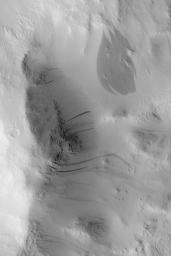
|
Dark Slope Streaks
- Click the image above for a larger view
- Full-Res JPEG (540 x 810) (52.6 kB)
- Full-Res TIFF (540 x 810) (438.1 kB)
Caption:
MGS MOC Release No. MOC2-412, 5 July 2003
On the dry, desert planet, Mars, wind is not the only contemporary geologic process that modifies the surface. Gravity also has a role to play. In regions such as Amazonis, Tharsis, and Arabia, most surfaces are covered by mantles of very fine dust. From time to time, an avalanche occurs on a dust-covered slope. This process is happening today, because changes have been observed by the Mars Global Surveyor (MGS) Mars Orbiter Camera (MOC) over the course if its mission, which began in September 1997. This picture shows a variety of dark slope streaks, formed by avalanches of dust, on the walls of a crater in southwest Amazonis near 7.6°N, 171.8°W. The size and shape of each slope streak, including the wide feature near the upper right, is determined by the steepness and texture of the slope on which it occurs. New slope streaks in some regions have been observed to form over periods of less than a few months to a year. This picture was taken in June 2003, and is illuminated from the lower left. The image is 2.3 km (1.4 mi) wide.
Cataloging Keywords:
| Name | Value | Additional Values |
|---|---|---|
| Target | Mars | |
| System | ||
| Target Type | Planet | |
| Mission | Mars Global Surveyor (MGS) | |
| Instrument Host | Mars Global Surveyor | |
| Host Type | Orbiter | |
| Instrument | Mars Orbiter Camera (MOC) | |
| Detector | ||
| Extra Keywords | Crater, Dust, Grayscale | |
| Acquisition Date | ||
| Release Date | 2003-07-07 | |
| Date in Caption | 2003-07-05 | |
| Image Credit | NASA/JPL/Malin Space Science Systems | |
| Source | photojournal.jpl.nasa.gov/catalog/PIA04613 | |
| Identifier | PIA04613 | |
